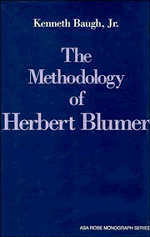2 - Blumer's development
Published online by Cambridge University Press: 15 December 2009
Summary
The first phase of Blumer's development is dominated by two distinct tendencies. On the one hand, Blumer sought to uphold the methodological unity of the sciences. “A priori,” he said in his doctoral dissertation, “there is nothing in human behavior which prevents the application of the natural scientific method to human behavior” (1928: 32). Yet, one facet of the human studies did indeed trouble Blumer's quest for methodological unity, and that facet was interpretive understanding. Blumer granted the substantive importance of such understanding even as he recognized some difficulties it posed for his view of proper scientific procedure. In consequence, Blumer's first phase is constantly thwarted by a tensional treatment of science and interpretation. We will follow this tension through its course in Blumer's earliest writings.
Initial bearings: The dissertation. The doctoral dissertation, Method in Social Psychology (1928), opens Blumer's first phase of methodological reflection. The work comprises four chapters. In the first (1928: 1–53), Blumer considers the nature of scientific method as well as some other approaches which had been suggested in light of the putatively special features of human behavior. In the second chapter (1928: 54–246), Blumer attempts to delineate the field of social psychology by critically reviewing how a number of authors had construed it. The third chapter (1928: 247–406), which attempts to align the first two, turns to the methods employed by social psychology to examine them “mainly with respect to their prejudgments” (1928: 249), that is, their orienting theoretical perspectives.
- Type
- Chapter
- Information
- The Methodology of Herbert Blumer , pp. 5 - 44Publisher: Cambridge University PressPrint publication year: 1990



